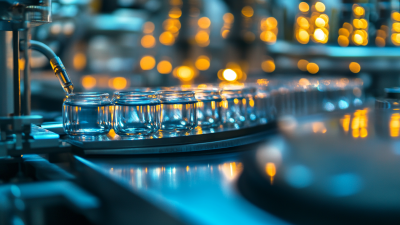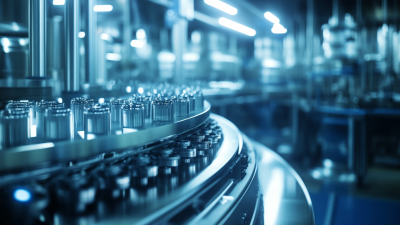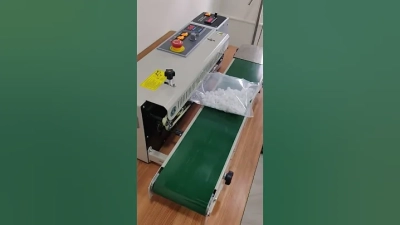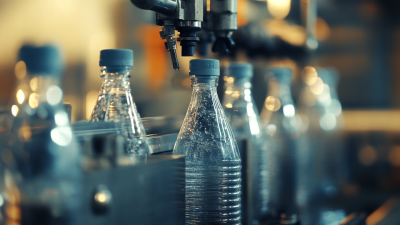What is the Impact of Advanced Packaging Machines on Efficiency and Sustainability in Manufacturing?
The advancement of packaging machines has become a pivotal factor in enhancing efficiency and sustainability within the manufacturing sector. As manufacturers face increasing pressure to optimize production processes while minimizing environmental impact, the implementation of state-of-the-art packaging technologies emerges as a viable solution. According to a report by Smithers Pira, it is estimated that smart packaging technologies can reduce waste by up to 20%, while also improving operational efficiency by 15%. Furthermore, the global demand for advanced packaging solutions is projected to reach $1 trillion by 2027, driven by the need for sustainable practices and innovative designs. In this context, exploring the impact of these sophisticated packaging machines not only highlights their role in streamlining operations but also underscores their significance in fostering a more sustainable manufacturing landscape.

Enhancing Production Efficiency with Advanced Packaging Machines: Key Metrics and Insights
The advent of advanced packaging machines is revolutionizing manufacturing processes by significantly enhancing production efficiency. According to a report by the Smithers Pira, businesses that implement modern packaging technologies can improve their processing speed by up to 30%. This acceleration not only streamlines operations but also allows manufacturers to better meet consumer demands while reducing lead times.
 Automation features in these machines facilitate predictive maintenance, ultimately decreasing downtime and optimizing resource allocation.
Automation features in these machines facilitate predictive maintenance, ultimately decreasing downtime and optimizing resource allocation.
In addition to efficiency gains, advanced packaging machines contribute positively to sustainability efforts within the manufacturing sector. A study from the Packaging Association found that eco-efficient packaging solutions can reduce material waste by as much as 20%, thereby minimizing environmental impact. Beyond waste reduction, these machines often utilize energy-efficient components that can decrease energy consumption by 15%, which is crucial for companies striving to meet corporate sustainability goals. This commitment not only lowers operational costs but also enhances the brand reputation among environmentally conscious consumers, creating a win-win scenario for both manufacturers and the planet.
The Role of Automation in Reducing Labor Costs and Waste in Manufacturing Processes
The integration of automation in manufacturing is reshaping the landscape, particularly in reducing labor costs and waste. As industrial automation powered by AI is projected to reach a staggering $443 billion by 2035, the shift is undeniable. Smart robots are increasingly replacing human workers across various sectors, with advanced technologies enhancing productivity and efficiency. In the apparel industry, for instance, automation is replacing labor-intensive processes, allowing for more agile manufacturing practices. This transformation not only cuts costs but also minimizes waste, aligning with sustainability efforts.
Moreover, the automotive sector is leveraging automation to tackle modern labor challenges, such as rising costs and workforce shortages. The focus on smarter fastening systems exemplifies how targeted automation can optimize production lines while maintaining high standards of quality. According to industry reports, businesses implementing automation technologies have seen significant improvements in process efficiency, with some achieving up to 30% reductions in operational costs. This clear trend towards automation highlights its critical role in fostering resilience and sustainability within manufacturing, while addressing labor-related complexities.
Impact of Advanced Packaging Machines on Efficiency and Sustainability
Sustainable Practices in Manufacturing: How Advanced Packaging Machines Minimize Environmental Impact
The advent of advanced packaging machines is transforming the manufacturing landscape, particularly in the pursuit of sustainable practices. These machines are designed with innovative features that not only enhance efficiency but also significantly reduce environmental impact. For example, by utilizing smart technology, these machines optimize material usage, minimizing waste during production. This translates to less raw material consumption and lower energy expenditure, which are critical components in reducing the carbon footprint of manufacturing processes.

Quantifying the Energy Savings: Data-Driven Benefits of Modern Packaging Solutions
Advanced packaging machines are transforming the manufacturing landscape by significantly enhancing efficiency and promoting sustainability. One notable advantage of modern packaging solutions is their capability to quantify energy savings. Data-driven approaches allow manufacturers to monitor consumption patterns and optimize their operations, leading to substantial reductions in energy use. For instance, real-time data analysis can identify areas where energy is wasted, enabling manufacturers to make informed adjustments and pursue eco-friendly practices.
To maximize these energy savings, manufacturers can implement several key strategies. First, regular maintenance of packaging machinery ensures it operates at peak efficiency, minimizing energy waste. Second, investing in training for staff about energy-efficient practices can foster a culture of sustainability throughout the organization. Lastly, exploring automation technologies can streamline packaging processes, allowing for faster production times and reduced energy consumption overall.
Overall, the integration of advanced packaging machines not only boosts operational efficiency but also plays a crucial role in achieving sustainable manufacturing goals. By harnessing data-driven insights about energy savings, manufacturers can position themselves as leaders in both productivity and environmental responsibility.
Case Studies: Successful Implementation of Advanced Packaging Machines in Various Industries
The successful implementation of advanced packaging machines has demonstrated remarkable benefits across various industries, enhancing both efficiency and sustainability. For instance, in the food and beverage sector, a leading manufacturer adopted a state-of-the-art packaging system that integrates robotics and AI technology. This shift not only streamlined their operations by reducing packaging time by 30% but also minimized material waste through precise cutting and sealing processes. Consequently, the company reported a significant reduction in their carbon footprint while maintaining product quality and freshness, showcasing the dual advantages of modern technology.
Another compelling case can be observed in the pharmaceutical industry, where packaging accuracy is paramount. A notable company implemented advanced automated packaging lines that ensured precise dosages and reduced human error. This innovation not only improved production rates but also enhanced compliance with regulatory standards. Furthermore, the use of eco-friendly materials in their packaging solutions aligned with the industry’s growing focus on sustainability. As a result, the company was able to demonstrate its commitment to environmental responsibility while meeting the rigorous demands of safety and efficacy in medication distribution.
Related Posts
-

10 Effective Tips for Choosing the Right Packaging Equipment Based on 2023 Industry Trends
-

How to Choose the Right Packaging Equipment for Your Business Success
-

Finding Reliable Suppliers for Your Packaging Equipment Needs Globally
-

Essential Export Certifications for Sourcing Packaging Equipment Globally
-

Unlocking the Specifications of Advanced Sealing Machines for Global Buyers
-

Essential Guide to Choosing the Right Packaging Machines for Your Business Needs